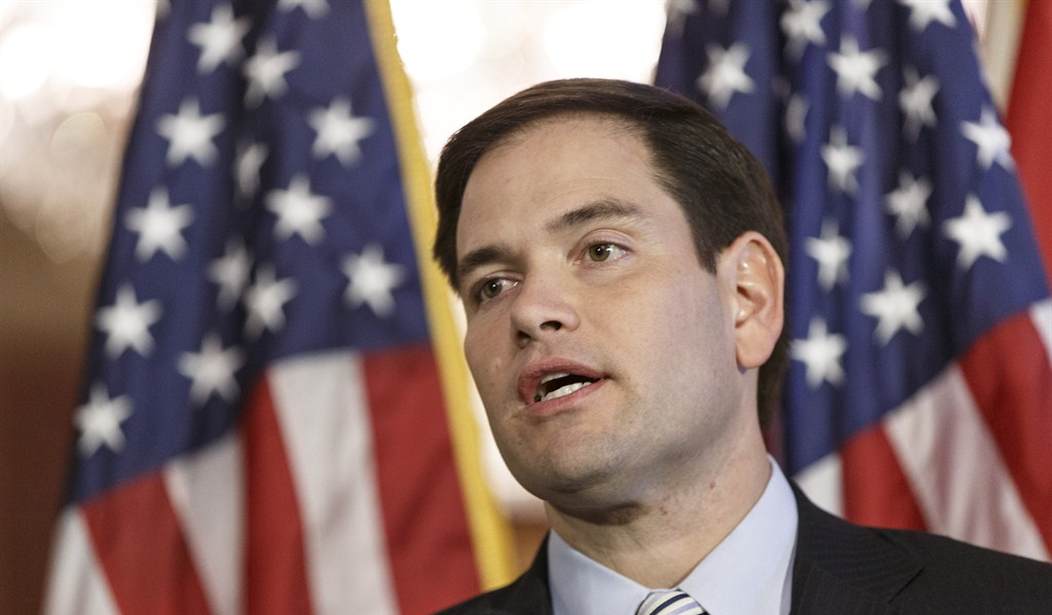Sen. Marco Rubio (R-FL) marked the 50th anniversary of President Johnson's War on Poverty with a speech yesterday critiqing the liberal policy approach to income inequality. There were some strong points, including this on spending:
Fifty years ago today, President Lyndon Johnson sought to address the plight of poverty by waging a war against it. On that day, he stood before a joint session of Congress and vowed, “It will not be a short or easy struggle, no single weapon or strategy will suffice, but we shall not rest until that war is won.”
His very next sentence served as a small window into his big-government vision for this war, and into its future failures. He said of the War on Poverty, “The richest nation on earth can afford to win it.” And with those words, he foreshadowed the belief still held by liberals to this very day: that government spending is the central answer to healing the wounds of poverty.
This on economic mobility:
the cashier at a fast food chain makes significantly less than the company’s CEO. The problem we face is not simply the gap in pay between them, but rather that too many of those cashiers are stuck in the same job for years on end, unable to find one that pays better. And it is this lack of mobility, not just income inequality, that we should be focused on.
This on the importance of marriage:
The truth is, the greatest tool to lift children and families from poverty is one that decreases the probability of child poverty by 82%. But it isn’t a government spending program. It’s called marriage.
Fifty years ago, today, when the War on Poverty was launched, 93% of children born in the United States were born to married parents. By 2010 that number had plummeted to 60%. It should not surprise us that 71% of poor families with children are not headed by a married couple.
Recommended
And this on government's role in perpetuating income inequality:
Instead of fostering a vibrant job-producing economy, our federal government is a major impediment to the enterprise and ingenuity of our people. An expensive tax code, burdensome regulations, and an unsustainable national debt are suffocating our economy’s ability to create enough steady and good paying jobs. That is why poverty and inequality have only gotten worse under the current administration.
But when it came time for policy prescriptions of his own, Rubio's speech veered to the left. First, Rubio proposed to "streamline most of our existing federal anti-poverty funding into one single agency," and then that agency would simply transfer all federal anti-poverty funds to the states.
Sounds conservative right? Transferring money from Washington to state capitols? That is federalism right?
Yes, it is a type federalism, but it is not a conservative federalism that shrinks government and holds government accountable. It would be a major expansion of what George Mason University Law School professor Michael Greve calls "cartel federalism," a brand of federalism which is undermining the Founder's true vision. Last year, Greve explained:
At the fiscal front, the central problem is the flood of transfer programs that encourage states to “experiment” with federal dollars. The most menacing example is Medicaid, which now consumes almost a quarter of state budgets. For the most part, this is not a result of federal coercion or mandates. It is a result of the states’ voluntary decisions to expand Medicaid so as to attract federal matching funds. The states’ perverse incentive to expand their domestic welfare state on our collective nickel—trillions of nickels—is, again, a federalism problem. So is the moral hazard that attends these arrangements that is, the risk that states will spend themselves to the brink of bankruptcy in hopes of a federal bailout. Greece exemplifies that problem; but then, so does Illinois.
Rubio's other policy proposal, replacing the Earned Income Tax Credit with wage subsidies, is also problematic for small government conservatives. Rubio explains:
I am developing legislation to replace the earned income tax credit with a federal wage enhancement for qualifying low-wage jobs...Of course, the enhancement will be highly targeted to avoid fraud or abuse and the amount will depend on a range of factors. But we know that by promoting work over dependence, this reform would increase work-force participation in struggling communities and, in turn, would have numerous social, economic and cultural benefits to areas hardest-hit by the Great Recession.
All conservatives should ask themselves: Do I want to empower President Obama to decide which are the "qualifying low-wage jobs" and which are not? Is there any doubt Obama, or future liberal presidents, would use this new government program to play favorites in the market place?
Would Obama or President Hillary Clinton every give wage subsidies to coal miners? Or Americans working at an oil refinery? Of course not.
How would the federal government prevent fraud and abuse without making the new program a burden on participating employers?
Instead of creating a brand new government program to subsidize low paying jobs, why not just cut the payroll tax for everyone? No favoritism. No fraud. No abuse. Just make it easier for employers to hire and let Americans take home more of their money every paycheck. Why not keep it simple?
Rubio should be applauded for taking the lead on an issue that too few Republicans like to talk about. But his policy proposals still need work.

























Join the conversation as a VIP Member